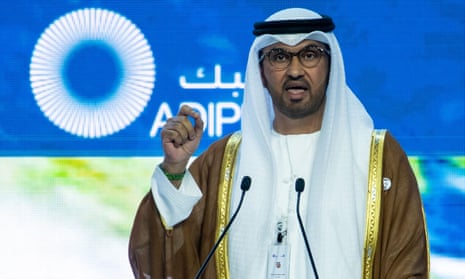Climate-wrecking emissions produced by the oil company of the Cop28 president, Sultan Ahmed Al Jaber, would take hundreds of years to remove using the carbon capture technology he has been promoting.
With just weeks to go until the crucial Cop28 climate summit, Al Jaber, who is the boss of United Arab Emirate oil company Adnoc, has been backing carbon capture as one solution to the climate crisis.
But analysis by Global Witness has found it would take the company 343 years to capture all the CO2 emissions it will produce in just the next six years.
Jonathan Noronha Gant from Global Witness said the findings proved carbon capture was “a dangerous red herring” that would do nothing to tackle the climate crisis.
“Sultan Al Jaber’s Cop is shaping up to be the Cop of false solutions, inundated by fossil fuel lobbyists pushing empty promises. If Al Jaber is serious – if we are serious – we must immediately reject the CCS [carbon capture and storage] false solution and tackle the existential oil and gas problem head on.’’
The research, based on production data from industry analysts Rystad, found that between 2023 and 2030 Adnoc’s oil and gas would produce an estimated 3,430m tonnes of carbon, including emissions from producing and burning fossil fuels.
By 2030, the company has pledged to increase the amount of carbon it captures to 10m tonnes per annum – a big jump from its current level. But even if it reaches that target, it would still take the company more than 340 years to capture the carbon it produces between now and 2030.
Noronha Gant said: “Carbon capture is a dangerous red herring, and Al Jaber need to look no further than his own oil company for proof.”
Campaigners are concerned that Al Jaber is going to use the Cop28, which starts next month in the United Arab Emirates, to promote technical solutions instead of pushing for large and rapid reductions in fossil fuel production and emissions.
In May this year he said: “If we are serious about curbing industrial emissions, we need to get serious about carbon capture technologies.”
Earlier this year, the Guardian revealed that the United Arab Emirates has the third biggest expansion plans for oil and gas in the world – surpassed only by Saudi Arabia and Qatar.
And as the climate crisis accelerates, with 2023 on course to be the hottest year on record, there has been widespread criticism of UAE as the host nation for Cop28 and of Al Jaber as president.
after newsletter promotion
Greta Thunberg called it “completely ridiculous” for him to take the role. A fellow youth climate justice organiser, Eric Njuguna from Kenya, called it “a stab in the back for poor countries to have a fossil fuel CEO on top of efforts to constrain the climate crisis”.
Campaigners have long rejected CCSas a climate solution, arguing it is being used by fossil fuel companies to claim they are cleaning up their act, while expanding their fossil fuel operations and pumping millions of tonnes of carbon into the atmosphere with devastating consequences.
In the US, a large percentage of CCS projects have failed, and a study in 2021 found that even among those that were successful, 81% of the carbon captured was actually used to produce more fossil fuels, as it was pumped underground to force out oil and gas.
In response to today’s findings, Adnoc said it had “taken significant steps to decarbonise” its operations.
The company also said that CCS was a “critical tool in holding back emissions” and that the International Energy Agency and the Intergovernmental Panel on Climate Change said CCS would play an “important and diverse role” in meeting climate goals.
